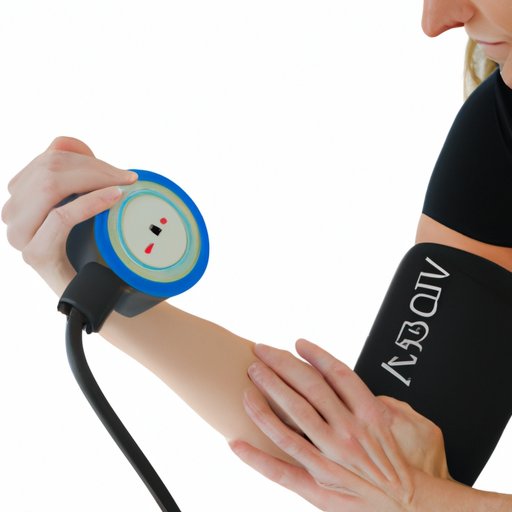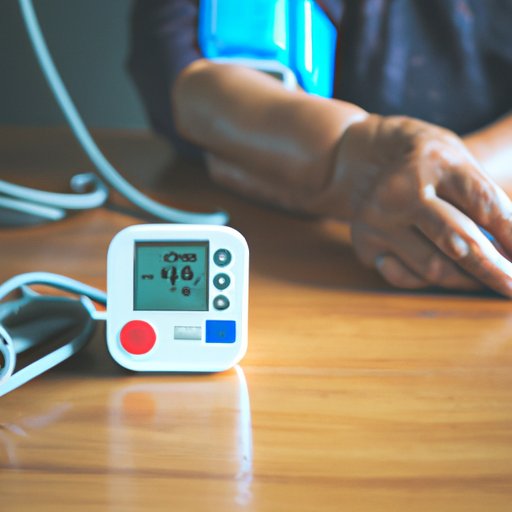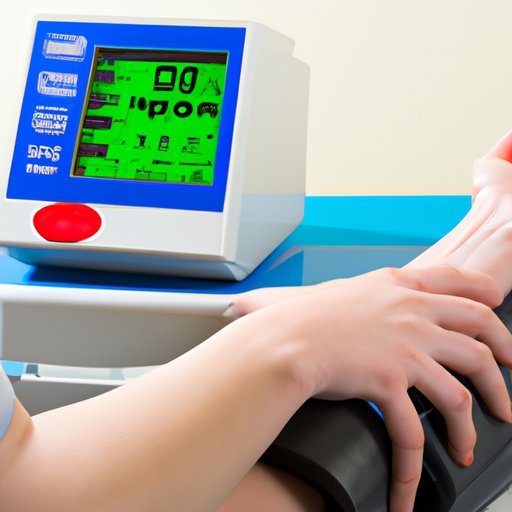Introduction
Blood pressure is a measure of the force of blood pushing against the walls of your arteries as it flows through your body. It is one of the most important indicators of your overall health. Exercise is an important part of maintaining a healthy lifestyle and can have a positive effect on your blood pressure.
In this article, we will explore the relationship between exercise and blood pressure, examining the effects of different types of exercise on blood pressure levels and whether or not exercise actually increases blood pressure in the short-term and long-term.
Exploring the Relationship between Exercise and Blood Pressure
The benefits of exercise on blood pressure are well-documented. Regular physical activity can help to reduce both systolic and diastolic blood pressure, which is the top and bottom number of your blood pressure reading, respectively. The American Heart Association recommends that adults should aim for 30 minutes of moderate physical activity, such as walking or cycling, five days a week.
However, there are several factors that can affect blood pressure levels during exercise, including age, gender, type of exercise, intensity, duration, and fitness level. For example, older adults may experience greater drops in blood pressure than younger people during exercise due to their lower resting heart rate.

Examining the Link between Exercising and High Blood Pressure
Different types of exercise can have different effects on blood pressure levels. Aerobic exercise, such as running or swimming, can cause a significant drop in blood pressure due to increased circulation. Strength training, such as weightlifting, can also help to reduce blood pressure, but the effects are usually less noticeable.
High blood pressure during exercise can be caused by a number of factors, such as dehydration, excessive caffeine intake, and over-exertion. It is important to stay hydrated before and after exercise, as dehydration can lead to an increase in blood pressure. Additionally, it is important to pay attention to your body’s signals and stop exercising if you feel overly fatigued or lightheaded.
Investigating if Exercise Causes an Increase in Blood Pressure
The short-term effects of exercise on blood pressure depend on the type and intensity of the exercise. Generally, aerobic exercise causes a decrease in blood pressure, while strength training has little effect. In some cases, vigorous exercise may cause a temporary increase in blood pressure due to a surge in adrenaline.
The long-term effects of exercise on blood pressure are more pronounced. Regular physical activity can help to reduce resting blood pressure levels over time. Additionally, regular exercise can help to reduce stress, which is another factor that can contribute to high blood pressure.
Does Exercise Increase Blood Pressure?
Understanding the role of intensity is key when it comes to determining if exercise increases blood pressure. Vigorous, intense exercise can cause a temporary spike in blood pressure, while moderate intensity exercise can lower it. However, the effects of exercise on blood pressure are not permanent and usually reverse within a few minutes.
It is important to note that there is no single answer to the question of whether or not exercise increases blood pressure. Each person’s body responds differently to physical activity and it is important to consult with your doctor before beginning any new exercise program.

The Impact of Exercise on Blood Pressure
Improving blood pressure through exercise can have a profound effect on your overall health. Regular physical activity can help to strengthen your heart and reduce your risk of developing cardiovascular disease. Additionally, exercise can help to reduce stress and improve your mental and emotional wellbeing.
It is important to understand your risk factors for high blood pressure before beginning an exercise program. If you have a family history of hypertension, you may want to consult with your doctor before starting a strenuous exercise regimen. Additionally, if you are overweight or have diabetes, it is important to talk to your doctor about the best approach for managing your blood pressure.

Analysing the Effects of Exercise on Blood Pressure Levels
The benefits of exercise on blood pressure are clear. Regular physical activity can help to reduce resting blood pressure levels, as well as improve overall cardiovascular health. However, it is important to remember that there are potential risks associated with increasing blood pressure through exercise.
Intense, vigorous exercise can cause a temporary spike in blood pressure, so it is important to take into account your own physical fitness level and risk factors for hypertension before engaging in strenuous physical activity.
Conclusion
In conclusion, exercise can play a vital role in maintaining a healthy blood pressure. Regular physical activity can help to reduce resting blood pressure levels, as well as improve overall cardiovascular health. However, it is important to understand the risks associated with increasing blood pressure through exercise.
By understanding the link between exercise and blood pressure, as well as the potential risks of increasing blood pressure through exercise, you can make informed decisions about your own physical activity. With the right approach, exercise can be an effective way to manage your blood pressure and improve your overall health.
(Note: Is this article not meeting your expectations? Do you have knowledge or insights to share? Unlock new opportunities and expand your reach by joining our authors team. Click Registration to join us and share your expertise with our readers.)
